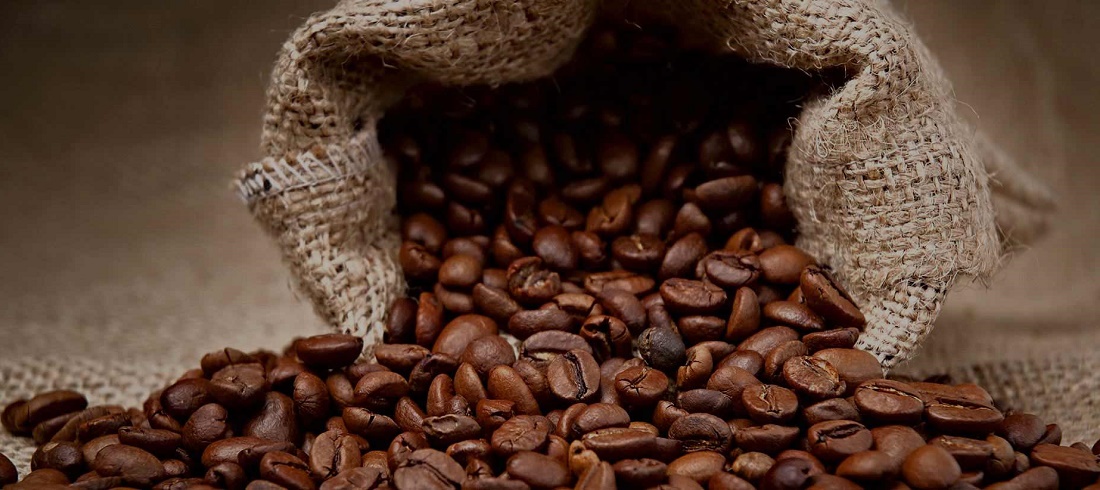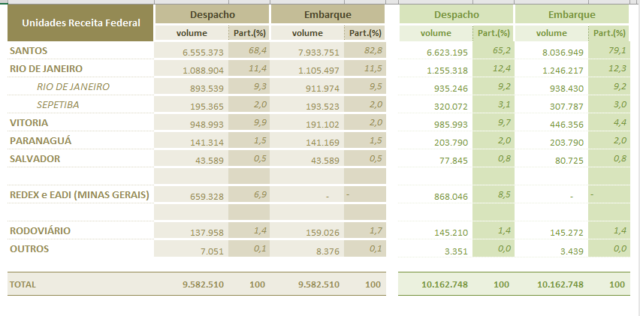
Brazilian coffee exports remain steady, fetch higher price
Apr, 13, 2020 Posted by Sylvia SchandertWeek 202016
Brazil exported 3.1 million bags of coffee in March, the same volume exported in March 2019. The sum includes green, soluble and roasted & ground coffee. Revenues reached US$ 423.72 million, up 6.1% compared to March last year. The average price was US$ 135.72, up 6% in the same comparison. Data was compiled by Cecafé, Brazil’s Council of Coffee Exporters.
Conilon coffee (robusta) grew significantly, up 30.2%, numbering 248.5 thousand bags (8% of exports by variety). Arabica coffee’s share was much higher at 82.2% of total volumes, reaching 2.6 million bags shipped. Soluble coffee represented 9.8% of shipments, which reached 306 thousand bags.
“Exports in March were very positive, with volumes at the same levels as in March 2019, despite limitations imposed by the current crisis and the smaller 19/20 crop. The exporting segment worked intensively on coffee preparation, logistics, offices and port areas, following all guidelines set out by the WHO and the federal, state and municipal public health agencies, to achieve the best possible result.”
Civil year
From January to March 2020, Brazil exported 9.6 million bags of coffee, with a highlight being the 24.9% growth of robusta exports (equivalent to 691.2 thousand bags) compared to the same period last year. Revenues reached US$ 1.3 billion and the average price stood at US$ 135.48, an increase of 3.3%.
Top destinations
In the first quarter of 2020, the main destination for Brazilian coffee remained the United States, which imported 1.8 million bags during the period (19.3% of total exports). Germany, the second largest consumer of Brazilian coffee, imported 1.7 million bags (equivalent to 17.8% of shipments) and Italy, the third largest consumer, imported 939 thousand bags (9.8%). Next came Belgium, with 493.6 thousand bags (5.2%); Japan, with 485.6 thousand bags (5.1%); Russia, with 322,500 bags (3.4%); Turkey, with 282.6 thousand bags (2.9%); Spain, with 245.2 thousand bags (2.6%); Canada, with 221.2 thousand bags (2.3%); and France, with 203.8 thousand bags (2.1%).
Among the listed destinations, Russia and Spain stood out as having increased their consumption of Brazilian coffee significantly. The increases were, respectively, 23.7% and 28.5% compared to the same period the year before.
When considering continents and economic blocs, exports to Africa stood out, with an increase of 44.5% (205 thousand bags), Central America, 29.2% (25.3 thousand bags), BRICS countries, 23, 8% (435.7 thousand bags), Eastern Europe, 21.4% (495.8 thousand bags), and Mercosur, 11.2% (166.9 thousand bags).
Alternative coffee
In the first quarter of this year, Brazil exported 1.6 million bags of alternative coffee varieties (those with superior quality or some type of sustainable practices certificate), which represented 16.7% of the total shipped in the period. Revenues from these varieties reached US$ 284 million, equivalent to 21.9% of total revenues earned. The average price of a bag of alternative coffees was US$ 177.16.
The 10 largest importing countries of alternative coffees represented 77.7% of shipments in the period from January to March this year. The United States continues to be the country that receives the most alternative coffees from Brazil, with 304.6 thousand bags exported (equivalent to a 19% share in exports), followed by Germany, with 213.3 thousand bags (13.3% ) and Italy, with 162.7 thousand bags (10.2%).
Next countries on this list are: Japan, with 160.9 thousand (10%); Belgium, with 150.9 thousand (9.4%); United Kingdom, with 66.9 thousand (4.2%); Sweden, with 50.7 thousand bags (3.2%); Finland, with 46,300 bags (2.9%); South Korea, with 46 thousand bags (2.9%); and the Netherlands, with 43.1 thousand bags (2.7%).
Harvest Year 2019/20
In the first nine months of the Crop Year 2019/20 (July 2019 to March 2020), Brazil exported 29.9 million bags of coffee, with outstanding performance to the 19.1% growth in exports of robusta coffee. Revenues from exports in the period to date reached US$ 3.8 billion and the average price has been US$ 128.63.
Ports
The Port of Santos continues to lead the way as an outlet for coffee this year, with an 82.8% share (7.9 million bags shipped by it). The ports of Rio de Janeiro com a distant second, with an 11.5% share (1.1 million bags shipped by them).
-
Ports and Terminals
Apr, 27, 2023
0
Port of Suape partners with Embratel to test private 5G network for cargo tracking
-
Meat
Oct, 02, 2023
0
Chile to remain largest importer of Paraguayan meat until September 2023
-
Meat
Aug, 08, 2024
0
Minerva Foods Set to Exit Live Cattle Export Business by Year-End
-
Shipping
Jun, 14, 2021
0
Ripples from Yantian port delays building to ‘unprecedented’ supply chain disruption



